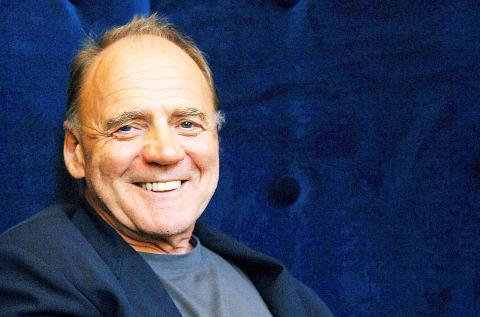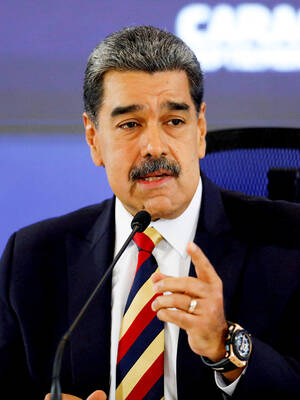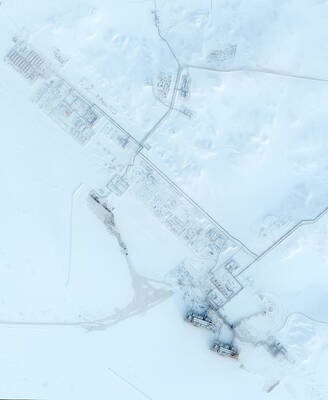Bruno Ganz, the Swiss actor who portrayed Adolf Hitler in Oscar-nominated film Downfall, died of cancer at his home in Zurich, Switzerland, on Saturday aged 77, his agent said.
He is survived by his son, Daniel.
Ganz had been active in German-language theater, film and television for more than 50 years and was the holder of the Iffland-Ring.

Photo: EPA-EFE
It is passed from actor to actor to mark the recipient as the “most significant and worthy” German-speaking actor of their era.
It is not known to whom Ganz had chosen to pass the heirloom at the time of his death.
The actor became internationally renowned for his 2004 portrayal of the dictator of Germany in the final days inside his Berlin bunker.
His lengthy rants in the film became a recurrent meme with subtitles laid over the footage to create parodies of everything from sporting events to current affairs.
Speaking to the Guardian in 2005, Ganz said that during the months of painstaking research, that involved looking at historical records, including a secretly recorded tape of Hitler, before taking on the role he became convinced that Hitler was suffering from Parkinson’s disease toward the end of his life.
“There is newsreel of him presenting medals to the Hitler Youth a few days before his death, and you can see his hand shaking, so I visited a hospital and observed Parkinson’s sufferers,” he said.
The actor said he was “fascinated” that Hitler “was not just supported by the German people; he was loved.”
“The relationship between him and them was almost religious. There was also that Wagnerian undercurrent — the hero dressed in white, standing against a corrupt world... It is like a cult. So it helped me that I am Swiss, not German,” he said.
However, Ganz added that he had not gained real insight into Hitler’s motivation, saying: “I cannot claim to understand Hitler. Even the witnesses who had been in the bunker with him were not really able to describe the essence of the man.”
On the actor’s 75th birthday the German news outlet Deutsche Welle reported that Ganz’s decision to quit school and pursue his dream of acting baffled his parents.
In the early days of his career he worked as a bookseller and a paramedic before he broke into film with roles in The Marquise of O, which won a special prize at Cannes in 1976, and Peter Stein’s drama Sommergaste (“Summer Guests”).
He also played a vampire in Werner Herzog’s Nosferatu the Vampyre (1979) and an angel in Wim Wenders’ Wings of Desire (1987) and its sequel, Faraway, So Close! (1993).
In 2008 Ganz appeared in The Baader Meinhof Complex and last year he was in Lars von Trier’s The House That Jack Built.
He played Heidi’s grandfather in a 2015 Swiss film about the national heroine, seeing it as a kind of patriotic duty.
“One of the most important actors of our time goes, his brilliant work remains. We mourn with the family and friends of Bruno Ganz,” German Minister of Foreign Affairs Heiko Maas said in a tweet.
He was remembered on Saturday evening at the closing gala of the Berlin Film Festival, where much of the film world was gathered to hear which film would win this year’s coveted Golden Bear award.
“We remember someone who can’t be here this evening: Bruno Ganz, in the sky over Berlin,” host Anke Engelke said.

VENEZUELAN ACTION: Marco Rubio said that previous US interdiction efforts have not stemmed the flow of illicit drugs into the US and that ‘blowing them up’ would US President Donald Trump on Wednesday justified a lethal military strike that his administration said was carried out a day earlier against a Venezuelan gang as a necessary effort by the US to send a message to Latin American cartels. Asked why the military did not instead interdict the vessel and capture those on board, Trump said that the operation would cause drug smugglers to think twice about trying to move drugs into the US. “There was massive amounts of drugs coming into our country to kill a lot of people and everybody fully understands that,” Trump said while hosting Polish President

Japan yesterday heralded the coming-of-age of Japanese Prince Hisahito with an elaborate ceremony at the Imperial Palace, where a succession crisis is brewing. The nephew of Japanese Emperor Naruhito, Hisahito received a black silk-and-lacquer crown at the ceremony, which marks the beginning of his royal adult life. “Thank you very much for bestowing the crown today at the coming-of-age ceremony,” Hisahito said. “I will fulfill my duties, being aware of my responsibilities as an adult member of the imperial family.” Although the emperor has a daughter — Princess Aiko — the 23-year-old has been sidelined by the royal family’s male-only

A French couple kept Louise, a playful black panther, in an apartment in northern France, triggering panic when she was spotted roaming nearby rooftops. The pair were were handed suspended jail sentences on Thursday for illegally keeping a wild animal, despite protesting that they saw Louise as their baby. The ruling follows a September 2019 incident when the months-old feline was seen roaming a rooftop in Armentieres after slipping out of the couple’s window. Authorities captured the panther by sedating her with anesthetic darts after she entered a home. No injuries were reported during the animal’s time on the loose. The court in the

Another tanker carrying liquefied natural gas from Russia’s sanctioned Arctic LNG (liquefied natural gas) 2 project has docked in a Chinese port, ship-tracking data showed, days after Russian President Vladimir Putin met Chinese President Xi Jinping (習近平) in Beijing. The London Stock Exchange Group (LSEG) tracking data indicated the Russian Voskhod LNG tanker was anchored at an LNG terminal in the port of Tieshan in Guangxi, China. The Russian flagged tanker, with a cargo of 150,000 cubic meters of LNG, was loaded up at the Arctic LNG 2 facility in Gydan in northern Siberia on July 19, LSEG data showed.